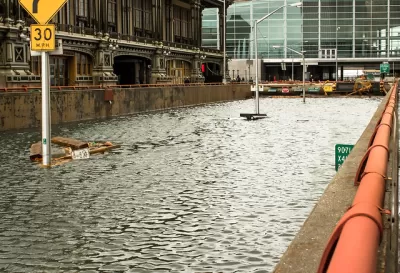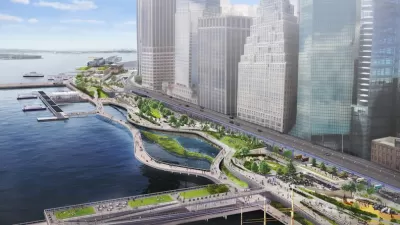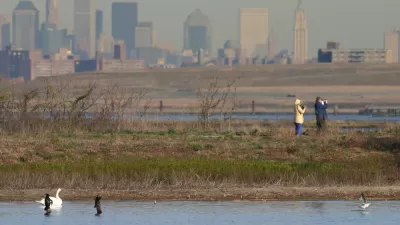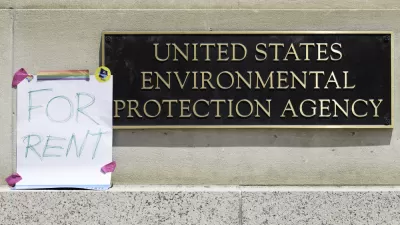The U.S. Army Corps of Engineers was on the verge of proposing a plan to protect New York City from storm surges and sea-level rise. Instead, the city of New York has lost federal support for a path toward climate resilience.

"The federal government has abruptly halted a study of New York City's coastal storm surge preparedness, " reports Jake Offenhartz, "throwing into question the fate of the region's most expansive climate resiliency effort and fueling speculation about politically motivated retribution by the Trump administration."
"The study was launched in 2017 by the U.S. Army Corps of Engineers to evaluate five possible defenses against severe storms and flooding that threaten coastal communities and the New York/New Jersey harbor," according to Offenhartz. After the study was shelved quietly last week, Army Corps officials blamed the decision on a "funding lapse."
Robert Freudenberg, vice president for energy and environment at the Regional Plan Association, is quoted in the article saying the decision is dangerous and unprecedented. Freudenberg also suggests in the article that the decision is motivated by politics. President Trump Tweeted on the subject of the $119 billion stormwall under consideration to protect the city, saying the barrier looks terrible and is "foolish."
A massive 200 Billion Dollar Sea Wall, built around New York to protect it from rare storms, is a costly, foolish & environmentally unfriendly idea that, when needed, probably won’t work anyway. It will also look terrible. Sorry, you’ll just have to get your mops & buckets ready!
— Donald J. Trump (@realDonaldTrump) January 18, 2020
FULL STORY: "Unprecedented and Dangerous": Trump Administration Halts NYC's Most Important Climate Resiliency Study

Planetizen Federal Action Tracker
A weekly monitor of how Trump’s orders and actions are impacting planners and planning in America.

San Francisco's School District Spent $105M To Build Affordable Housing for Teachers — And That's Just the Beginning
SFUSD joins a growing list of school districts using their land holdings to address housing affordability challenges faced by their own employees.

The Tiny, Adorable $7,000 Car Turning Japan Onto EVs
The single seat Mibot charges from a regular plug as quickly as an iPad, and is about half the price of an average EV.

San Diego Votes to Rein in “Towering” ADUs
City council voted to limit the number of units in accessory buildings to six — after confronting backyard developments of up to 100 units behind a single family home.

Texas Legislature’s Surprising Pro-Housing Swing
Smaller homes on smaller lots, office to apartment conversions, and 40% less say for NIMBYs, vote state lawmakers.

Even Edmonton Wants Single Staircase Buildings
Canada's second most affordable major city joins those angling to nix the requirement for two staircases in multi-family buildings.
Urban Design for Planners 1: Software Tools
This six-course series explores essential urban design concepts using open source software and equips planners with the tools they need to participate fully in the urban design process.
Planning for Universal Design
Learn the tools for implementing Universal Design in planning regulations.
Smith Gee Studio
City of Charlotte
City of Camden Redevelopment Agency
City of Astoria
Transportation Research & Education Center (TREC) at Portland State University
City of Camden Redevelopment Agency
Municipality of Princeton (NJ)





























